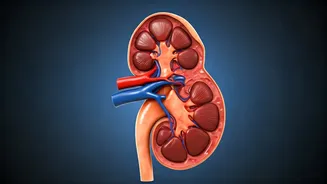Understanding Kidney Function
Kidneys, two bean-shaped organs, are essential for filtering waste and excess fluids from the blood. They produce urine to eliminate these substances and keep
the body's internal environment balanced. They also regulate blood pressure, produce red blood cells, and activate vitamin D for bone health. Chronic kidney disease (CKD) can be a silent threat, often showing no symptoms in its early stages. Over time, CKD can lead to kidney failure, requiring dialysis or a transplant to sustain life. Several factors increase the risk of CKD, including diabetes, high blood pressure, heart disease, and a family history of kidney disease. Regular check-ups and early detection are, therefore, vital, especially for those in high-risk groups. Lifestyle choices can significantly impact kidney health. Adopting a healthy diet, staying hydrated, and avoiding excessive alcohol consumption can significantly contribute to better kidney function. Knowing the importance of kidneys and the factors that influence their health is the first step toward preventive care. Being proactive and aware of potential risks is extremely important.
Nourishing Your Kidneys
A kidney-friendly diet often involves limiting sodium, phosphorus, and potassium, as these minerals can build up in the blood when the kidneys are not functioning correctly. High levels of these minerals can cause bone problems, heart issues, and other complications. Staying hydrated is also crucial for kidney health. Adequate water intake helps the kidneys flush out waste products effectively, preventing the formation of kidney stones and reducing the workload on the kidneys. The amount of water needed varies depending on individual factors, like activity levels and climate, but generally, drinking at least eight glasses of water per day is recommended. Additionally, choosing whole, unprocessed foods over processed options is an important step. Processed foods are often high in sodium and additives that can strain the kidneys. By focusing on fresh fruits, vegetables, lean proteins, and whole grains, individuals can support their kidney health. Making these dietary and hydration choices can have a positive effect on kidney health. Consulting with a healthcare provider or a registered dietitian can further help tailor the diet to individual needs.
Adopt Healthier Habits
Alongside diet and hydration, other lifestyle changes can significantly impact kidney health. Regular exercise is essential, as it helps manage blood pressure, reduce the risk of diabetes, and support overall cardiovascular health, all of which benefit the kidneys. Aim for at least 30 minutes of moderate-intensity exercise most days of the week. Controlling blood pressure is critical. High blood pressure is a leading cause of kidney disease, so monitoring and managing it through diet, exercise, and medication (if prescribed) are essential steps. Managing diabetes effectively is also paramount. High blood sugar levels can damage the kidneys over time. Working with a healthcare team to maintain stable blood sugar levels through diet, exercise, and medication can protect the kidneys. Limiting alcohol consumption and avoiding smoking can also protect your kidneys. Alcohol can strain the kidneys, and smoking damages blood vessels, including those in the kidneys. These lifestyle adaptations form a comprehensive approach. These simple changes can enhance kidney health and lower the chances of CKD. Regular medical check-ups and open communication with your healthcare provider are extremely important to ensure that any health concerns or symptoms are identified and treated promptly.
Drugs and Your Kidneys
Certain medications can potentially harm the kidneys, so it’s essential to be aware of their effects and use them cautiously. Nonsteroidal anti-inflammatory drugs (NSAIDs), such as ibuprofen and naproxen, can reduce blood flow to the kidneys and cause kidney damage, especially with prolonged use. Antibiotics, particularly certain types, can also pose a risk. Some antibiotics are filtered by the kidneys and can become toxic if the kidneys are not functioning correctly. Always discuss your medication regimen with your doctor, including any over-the-counter medications or supplements, to ensure they are safe for your kidneys. If you have kidney problems, your doctor may recommend alternative medications or adjust the dosage. Regular check-ups and kidney function tests, especially if you take potentially harmful medications, are critical. Being informed and proactive about the medications you take is an important step in protecting kidney health. Never start or stop taking any medication without consulting your doctor or a qualified healthcare professional.












